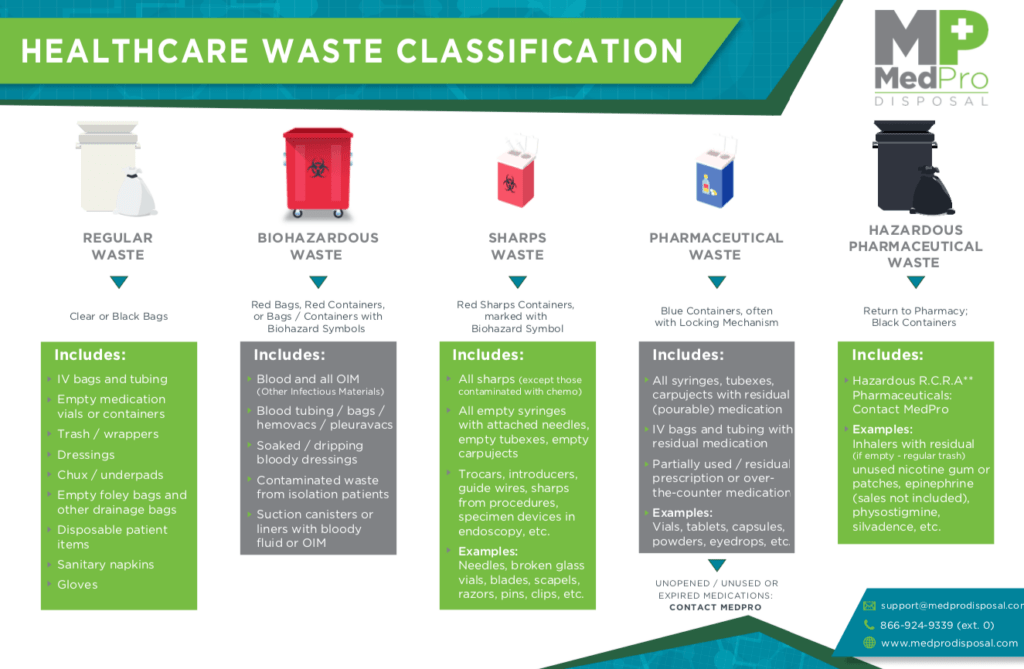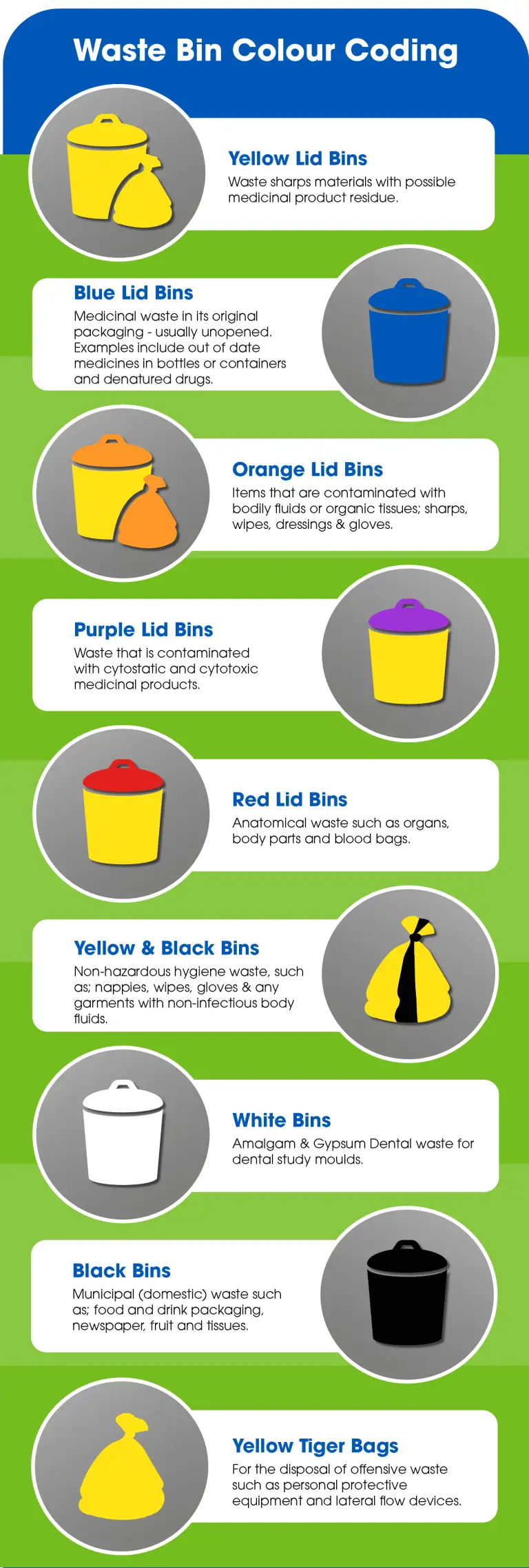Turnkey Medical Waste Removal Service: Seamless Disposal for Medical Care Facilities
Wiki Article
The Significance of Effectively Taking Care Of Medical Waste
Appropriate management of medical waste is of utmost value in health care facilities. The handling, storage space, and disposal of clinical waste need stringent adherence to policies and guidelines to guarantee the safety of people, health care workers, and the environment. Incorrect administration of clinical waste can pose serious wellness risks, consisting of the transmission of contagious conditions and injuries from sharp objects. Incorrectly disposed of medical waste can have detrimental results on the setting, contaminating water sources and dirt. Medical care centers have lawful and regulatory commitments to correctly manage clinical waste, and failure to conform can lead to charges and legal consequences. By executing ideal techniques for risk-free handling and disposal of clinical waste, medical care experts can mitigate these threats and add to a much safer and healthier setting for all. Sufficient education and training on waste management are crucial for health care specialists to satisfy their responsibilities in this field.Health And Wellness Risks Connected With Improper Waste Monitoring
Improper management of medical waste poses substantial wellness dangers to both health care employees and the public - WasteX Medical Waste Disposal. Clinical waste, which consists of sharps, contagious products, drugs, and contaminated materials, calls for correct handling and disposal to stop the spread of infections, injuries, and direct exposure to damaging materials
One of the key wellness threats related to inappropriate medical waste administration is the transmission of transmittable diseases. Medical care workers that come into contact with polluted waste may get illness such as HIV, hepatitis, or other bloodborne virus. If clinical waste is not correctly disposed of, it can contaminate the atmosphere, water sources, and also food, leading to the spread of conditions within the neighborhood (medical waste removal service).
Incorrect waste administration can also result in injuries, particularly from sharps such as needles, scalpels, and damaged glass. Accidental needle pricks can cause the transmission of bloodborne conditions, while cuts from sharp things can trigger severe injuries and infections.
Moreover, the incorrect disposal of pharmaceutical waste can bring about the contamination of water supplies. When ended or unused medications are flushed down the toilet or discarded wrongly, the chemicals can seep into water sources, impacting water life and possibly going into the human food chain.
Ecological Effect of Incorrectly Disposed Medical Waste
One of the considerable effects of poor monitoring of medical waste is its detrimental effect on the environment. Incorrectly disposed medical waste poses a serious risk to ecological communities, water bodies, and the general balance of the setting. WasteX Medical Waste Disposal. The harmful materials included in medical waste, such as infectious representatives, pharmaceuticals, and chemicals, can pollute air, water, and dirt, bring about extensive air pollution and degradationWhen medical waste is not appropriately segregated, treated, and disposed of, it can locate its method right into water bodies through improper landfill methods or illegal disposing. This can result in the contamination of groundwater and surface area water, affecting water life and potentially contaminating drinking water sources. The release of damaging chemicals and pharmaceuticals right into the setting can disrupt ecological communities and injury both animal and plant types.
In addition, inappropriate incineration of clinical waste can launch harmful pollutants, consisting of furans and dioxins, right into the environment. These toxins have been linked to different health issues, consisting of breathing issues, reproductive problems, and even cancer cells. The launch of greenhouse gases throughout incineration additionally adds to climate change.
To minimize the environmental impact of poorly disposed medical waste, it is important to carry out proper waste management techniques. This includes partition of waste at the source, suitable treatment approaches, and safe disposal techniques. By doing so, we can minimize the pollution and safeguard the atmosphere from the hazardous consequences of medical waste mismanagement.
Governing and legal Responsibilities for Health Care Facilities
In order to address the ecological influence of incorrectly disposed medical waste, medical care facilities are needed to stick to legal and regulatory obligations. These responsibilities are established to ensure the proper handling, storage, transportation, and disposal of clinical waste in a secure and eco liable way.One of the essential lawful commitments for health care facilities is to get the needed authorizations and licenses for dealing with clinical waste. This consists of obtaining a waste generator identification number and abiding by federal, state, and local policies. Medical care centers should also maintain thorough documents of the types and quantities of medical waste produced, in addition to the methods utilized for its disposal.
Furthermore, medical care centers need to execute proper segregation and product packaging treatments for various sorts of medical waste, such as sharps, transmittable waste, and pharmaceutical waste - medical waste disposal service. This consists of utilizing watertight containers, biohazard bags, and sharps containers that meet regulatory standards
Healthcare facilities are also responsible for making certain that their personnel get suitable training on the proper handling and disposal of medical waste. This consists of training on infection control, individual protective devices, and waste administration procedures.
Best Practices for Safe Handling and Disposal of Medical Waste
To ensure the secure handling and disposal of clinical waste, healthcare facilities ought to execute ideal practices. These practices are important to protect the wellness and safety of both medical care employees and the general public. The proper monitoring of medical waste is important in protecting against the spread of infectious conditions and minimizing environmental contamination.One of the very best practices for safe handling and disposal of clinical waste is segregation. Health care centers should separate various sorts of clinical waste, such as sharps, infectious products, and pharmaceutical waste, to stop cross-contamination. Appropriate labeling and color coding of waste containers likewise play a vital duty in ensuring the appropriate partition of medical waste.
Another crucial best technique is the usage of suitable containers for storing and carrying clinical waste. These containers should be leak-proof, puncture-resistant, and appropriately secured to avoid any feasible launch of hazardous products. Furthermore, medical care centers should establish clear procedures for the collection, storage space, and transportation of clinical waste to lessen the risk of exposure and contamination.
Additionally, health care facilities should train their staff on the proper handling and disposal of clinical waste. Normal training sessions and refresher course training courses should be carried out to keep health care employees updated on the current laws and guidelines. This will certainly help guarantee that every person associated with the procedure recognizes the potential threats and is furnished with the required knowledge and skills to manage clinical waste securely.
Education and Training for Healthcare Professionals in Waste Monitoring
Health care specialists call for comprehensive education and learning and training in waste administration to make sure the appropriate handling and disposal of medical waste. The monitoring of medical waste is an essential component of healthcare operations as it straight affects the health and wellness of both medical care employees and the public. Appropriate education and training outfit healthcare professionals with the required expertise and skills to deal with and dispose of clinical waste in a safe and environmentally responsible manner.Education and learning and training programs for medical care professionals in waste management cover a variety of topics, consisting of the category and segregation of medical waste, correct packaging and labeling, storage space and transport demands, and using individual safety tools. These programs likewise emphasize the relevance of adherence to neighborhood, national, and global laws and standards governing clinical waste management.
By getting detailed education and training in waste monitoring, healthcare professionals can efficiently reduce the threats related to clinical waste, such as the transmission of contagious conditions and the possible injury to the atmosphere. WasteX Medical Waste Disposal. Well-trained experts can identify and apply best practices that promote sustainability and reliable waste management practices within medical care centers.
Continual education and learning and training in waste administration need to be an ongoing concern for health care specialists, as waste administration methods and laws may progress gradually. By remaining up-to-date with the most recent growths in waste monitoring, health care specialists can make certain that they are furnished with click here now the understanding and abilities necessary to make informed decisions and add to the overall enhancement of waste monitoring practices in health care settings.

Verdict
To conclude, correct administration of clinical waste is vital to minimize health threats and decrease the ecological impact. Healthcare facilities have legal and governing obligations to ensure risk-free handling and disposal of clinical waste. Adhering to ideal methods and giving education and learning and training for health care professionals in waste management are essential for keeping a healthy and balanced and safe environment. By sticking to these guidelines, medical care facilities can safeguard public health and wellness and preserve the honesty of our ecological communities.
Healthcare specialists require thorough education and learning and training in waste administration to ensure the appropriate handling and disposal of clinical waste - medical waste disposal service. The administration of medical waste is a vital part of medical care operations as it straight impacts the wellness and safety of both medical care employees and the general public
Report this wiki page